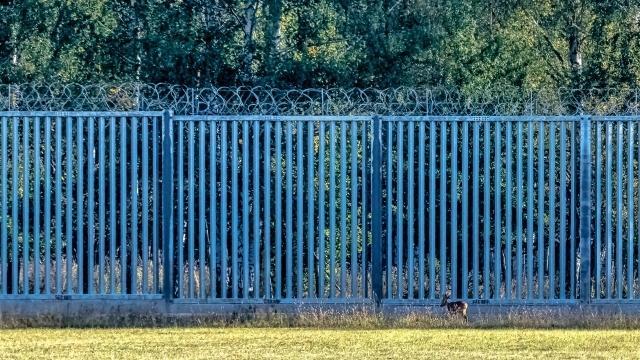
Poland-Belarus border wall. By Marcin on Adobe Stock
The wall with a view of Europe: Two long years of the EU–Belarus border crisis
The humanitarian crisis on the EU-Belarus border has been unfolding since mid-2021, mostly out of public sight. Increasingly anxious about the raising numbers of people dying on the forested border, the EU came to realize that “this is the moment now for a European migration management policy” to gain speed (Ursula von der Leyen). In the meantime, Poland, Lithuania, and Latvia declared a state of emergency, accusing Belarussian President Lukashenko of using migrants as weapons for a hybrid war aimed to threaten the security of the EU. In June 2022, Poland completed a 5.5-metre-high steel wall on a 186-kilometre border to deter migrants entering from Belarus. Yet, the wall has neither stopped migrants nor prevented unnecessary deaths, illegal pushbacks or violence. Today, the tough measures employed at the border continue to be seen, on the one hand, as flagrant violation of human rights, and on the other hand, as necessary and unavoidable. And while Europe can indeed step up to a challenge – as it’s response to millions of Ukrainians fleeing Russia’s invasion has shown – it can also, and at the same time, rationalize the crisis and accept the normalization of violence.
This event is presented in person and online. Zoom details below
Speaker
Dr Katarzyna K Williams is Deputy Director of the ANU Centre for European Studies. Her research focuses on migrant cultures and diaspora, particularly life narratives, issues of displacement and transcultural experience. She is also interested in memory studies, memorialization and the politics of memory.
This series is an ANU-wide collaboration spearheaded by the Migration Hub @ ANU, in collaboration with the School of Archaeology and Anthropology
For online attendance, see Zoom details below
https://anu.zoom.us/j/86557701787?pwd=cnIreVB5eG8vNmlibWtHMjRKaEtIZz09
(Meeting ID: 865 5770 1787. Password: 836061)
Location
Speakers
- Dr Kasia Williams, Deputy Director, Centre for European Studies, ANU College of Arts & Social Sciences
Event Series
Contact
- Sverre Molland
File attachments
| Attachment | Size |
|---|---|
| 21-09-2023_Migration_Series_2023_Kasia_Williams.pdf(6.99 MB) | 6.99 MB |